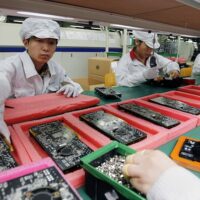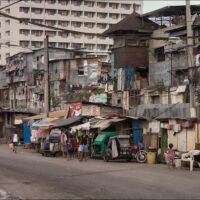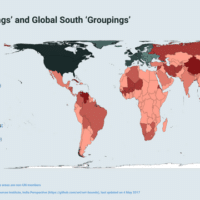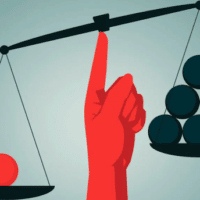-
Dilemmas of Humanity Conference discusses new framework for development in the Global South
Dozens of economists, intellectuals, and movement leaders have converged in São Paulo for the IV International Dilemmas of Humanity conference.
-
U.S. VP JD Vance admits West wants Global South trapped at bottom of value chain
At a summit held by a Silicon Valley venture capital firm, U.S. Vice President JD Vance gave a speech about globalization that made it clear that the West wants to keep poor, formerly colonized countries in the Global South trapped at the bottom of the global value chain, through monopolistic control of advanced technologies.
-
Dossier no. 86: Imperialist War and Feminist Resistance in the Global South
In the Global South, women creatively resist the impact of unilateral coercive measures, a form of hyper-imperialist hybrid warfare that reinforces patriarchy and other forms of social discrimination.
-
The eighth Continent is the Continent of Sleaze: The Fiftieth Newsletter (2024)
The Global North and its corporate executives have wielded the concept of ‘corruption’ to underdevelop the Global South, whose social wealth it instead injects into the Continent of Sleaze.
-
Vania Bambirra: A voice from the Global South
Consequently, despite co-founding dependency theory, teaching at some of the most important universities in Latin America, and publishing dozens of highly original books and articles, Vania Bambirra’s name is completely absent from IR and IPE handbooks and disciplinary surveys.
-
Rich countries drain ‘shocking’ amount of labor from the Global South
Workers in the Global South—from farm workers to scientists—power the world economy but face a yawning wage gap.
-
Global South sees U.S. Congress hail Israeli killer of 39,000 of their people mostly women and kids
The Health Ministry in Gaza reports that as of the end of July, 2024, more than 39,000 Palestinians, mostly women and children, have been slaughtered in Gaza by the Israeli military using hegemon U.S.A.’s mighty weapons of mass destruction.
-
Neo-liberalism has increased mass poverty
It is not a difficult proposition to substantially reduce poverty through redistributive measures. About one tenth of India’s GDP would need to be devoted to providing adequate food for the population, basic and comprehensive healthcare, compulsory free education, employment guarantee and old age pension; for which additional taxation of 7 per cent of GDP that the rich and super-rich can easily bear, would be needed. Combined with vigorous implementation of the existing National Food Security Act 2013 and the MG National Rural Employment Guarantee Act, genuine large-scale reduction of poverty would result
-
Corporate power is killing the planet
In the 1950s, a system of corporate courts was created to allow Western businesses to sue the Global South for threatening their profits—and now fossil fuel giants are using it to stop any country from fighting the climate crisis.
-
Racist asylum and immigration policy in the U.S. and Canada
Fears of an “invasion” at the border are nothing more than white supremacy being openly expressed. It could not be otherwise in a settler colony created by migration from Europe. To millions of people the word American still refers to whites only.
-
Hyper-imperialism: A dangerous decadent new stage
It has been a scant 30 years since the ‘end of history’ was declared by bourgeois ideologists in pantomimes of wish-fulfillment for sensing the inviolability of United States imperialism. For peoples’ struggles and movements feeling the boot of imperialism on their necks, no such end was in sight.
-
The Global South takes Israel to court: The Third Newsletter (2024)
On 11 January, Adila Hassim, an advocate of the High Court of South Africa, stood before the judges of the International Court of Justice (ICJ) and said: ‘Genocides are never declared in advance. But this court has the benefit of the past 13 weeks of evidence that shows incontrovertibly a pattern of conduct and related intention that justifies a plausible claim of genocidal acts’.
-
Time to reclaim black revolutionary politics
Mikayla Tillery reviews Kevin Okoth’s Red Africa: Reclaiming Revolutionary Black Politics. She delves into Okoth’s incisive critique of Afro-pessimism, Negritude, and the academic misinterpretations of Franz Fanon. Tillery discusses Okoth’s arguments against the idea that Marxism is Eurocentric by examining the historical suppression of Marxism in Kenya. She reveals how he highlights the contributions of black revolutionaries and reframes Marxism as a potent force for decolonisation and anti-imperialism.
-
Kenya – a loyal lieutenant of imperialism
On the 60th anniversary of Kenya’s independence, Gathanga Ndung’u writes that the country has spent decades as the loyal servant of imperialism. The country may have express highways, a busy international airport, a modern railway, and an emerging silicone savannah, but in reality, Kenya seeks only to endear itself to world leaders and potential investors through well-packaged imaginaries of the present and the future. Ndung’u lists some of Kenya’s extensive betrayals – not least support for Israel and the abandonment of Palestinians.
-
The G77+China Havana Summit is a bold step toward building a multilateral world
The G77+China Summit has given the Cuban President a perfect opportunity to strengthen ties with like-minded developing countries and to raise the voice of the Global South against America’s “aggressive imperialist policy.”
-
West tells Global South ‘you can’t be neutral’ in Ukraine war: You are either with us, or against us
The foreign ministers of the US, Germany, and Ukraine told the world at the Munich Security Conference, “Neutrality is not an option” in the West’s proxy war against Russia, implicitly criticizing the vast majority of Global South countries, which are independent.
-
The global South has lost $152 trillion through unequal exchange since 1960
Dependency and world-systems theorists have long argued that “unequal exchange” is a key driver of global inequality.
-
Climate change has long prompted migration, now it may drive anti-capitalist consciousness, too
U.S. government programs for migrants who cross the country’s southern border are punitive and disjointed.
-
A prologue to the Swazi revolution, one year in the making
1 year ago, in June and July, a massive uprising led by Communists in Swaziland threatened to overthrow the last absolute monarchy in Africa. With the help of its imperialist allies, the Swazi monarchy brutally repressed this uprising, but they have only temporarily delayed the inevitable. One year later, we can reflect on the conditions that caused the revolution, its successes and missed opportunities, the role of imperialism in tipping the scales to a comprador bourgeoisie, and what has changed in the year since in Swaziland as revolutionary agitation continues.
-
The Global South has the power to force radical climate action
After all, Western economies–and their economic growth–depend utterly on labour and resources from the South.




















![Protesters carry placards as they demonstrate as part of a global day of action on climate change outside parliament in Cape Town, South Africa, September 25, 2020 [Mike Hutchings/Reuters]](https://mronline.org/wp-content/uploads/2022/07/Screen-Shot-2022-07-06-at-8.34.05-PM-200x200.png)